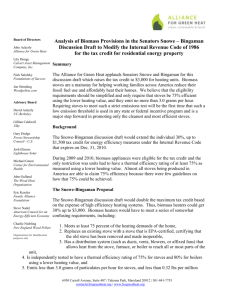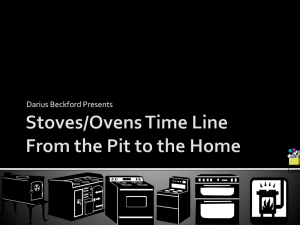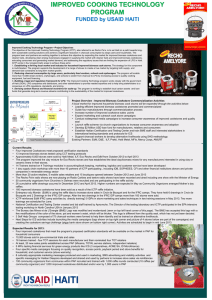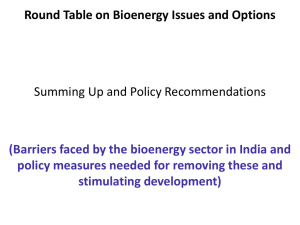survey - The Alliance for Green Heat
advertisement
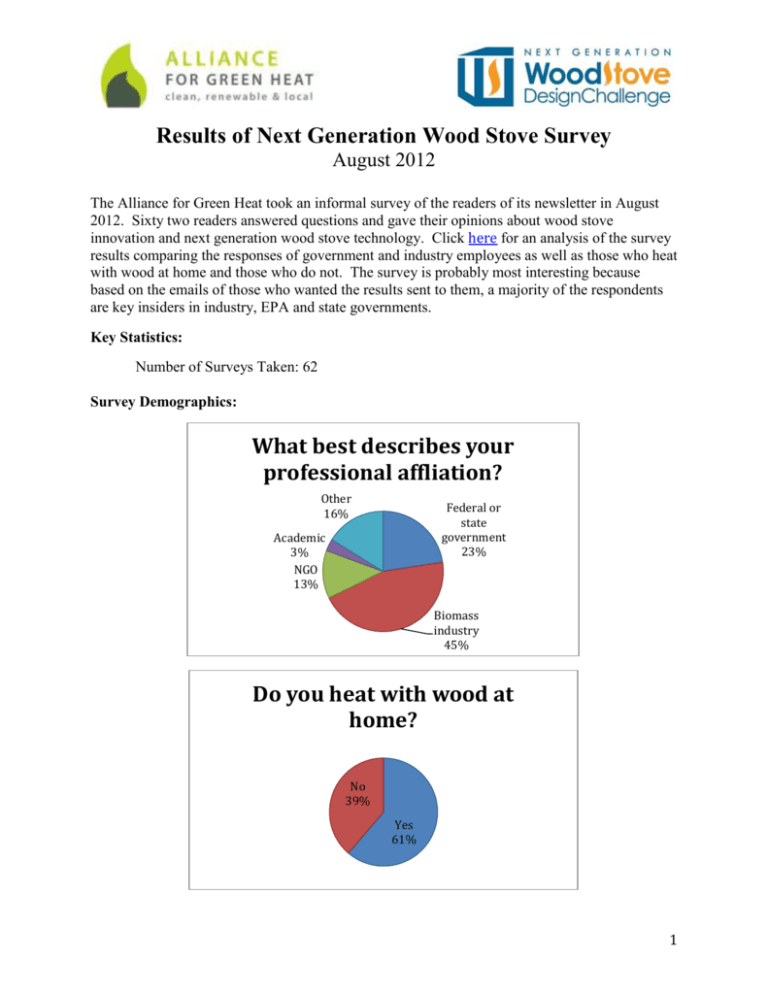
Results of Next Generation Wood Stove Survey August 2012 The Alliance for Green Heat took an informal survey of the readers of its newsletter in August 2012. Sixty two readers answered questions and gave their opinions about wood stove innovation and next generation wood stove technology. Click here for an analysis of the survey results comparing the responses of government and industry employees as well as those who heat with wood at home and those who do not. The survey is probably most interesting because based on the emails of those who wanted the results sent to them, a majority of the respondents are key insiders in industry, EPA and state governments. Key Statistics: Number of Surveys Taken: 62 Survey Demographics: What best describes your professional affliation? Other 16% Federal or state government 23% Academic 3% NGO 13% Biomass industry 45% Do you heat with wood at home? No 39% Yes 61% 1 Results: Is more rapid technological innovation for wood stoves necessary for the future of the industry? Don't know 6% No 15% Yes 79% Selected Comments “We need to encourage the change-out of older dirtier burning stoves, not mandate a 'super stove'. This will do more to clean up air sheds, while keeping prices within reach of average consumers.” “If we could get everyone to use the most recent technology, wood stoves would be the least of our worries when it comes to both pollution and health.” “If the industry doesn't manufacture cleaner, more reliable stoves, then consumers will abandon this industry for cleaner products that work better and don't harm their neighbors.” “If improved technology is to be developed, efforts have to be made to hold down costs. Otherwise, there is a disincentive for people to use wood and the danger exists that low income folks may be disenfranchised.” “I think the emphasis should be on shifting to the existing technology of masonry heaters! Perhaps rapid technological innovation would be well spent on bringing down the $$$ pricetag for masonry heaters, so more people could afford to switch.” “We need to try to incentivize getting not only lab tested stoves cleaner stoves to the market, but ones that reduce operator error.” “It all depends upon EPA and state air regulators and the degree to which they regulate. I think that consumers are mostly satisfied with the wood stoves that are now available.” “In the wrong hands all wood stoves can be polluting. All stoves should have a double burn and have particulate filters on their chimneys. The man who developed a cook stove that used tiny amounts of wood and no smoke has the right technology. Wood stoves should not be in urban environments where houses are close together.” “Put more emphasis on getting pre EPA appliances out of use; such as not being able to sell a home with an older appliance in it. The older appliance must be scrapped.” “EPA must make their test protocol adaptable to the way a new stove is designed to be burned.” 2 What has hampered wood stove innovation? Lack of government R&D funding 3% Lack of demand for high performance stoves 15% Shrinking number of wood stove consumers 6% Narrow EPA test method 10% None of the above, they are sufficiently innovative 5% All of the above factors 48% Other 13% Other barriers to wood stove innovation: “Industry is fearful of moving forward. Government needs to place incentives on more efficient products.” “The costs associated with getting all of these technological advances in people's homes are prohibitive. Having the old inefficient stoves out there in use further tarnishes the image of wood stoves as a viable heat source.” “Creativity and no mandate for near zero emissions/particulates.” How much has EPA regulation impacted wood stove innovation? Don't know 10% Hardly at all 11% Enormously 15% Some 29% Quite a bit 35% 3 Would Energy Star-like incentive programs for wood stoves be good for consumers and/or the industry? Maybe 16% No 8% Yes 76% Selected Comments: “Test methods are not ready for this. It will be years before this could be implemented fairly.” “Outright cash incentives or purchase incentives are not good; behavioral incentives that tie with mortgage or access to finance make better sense.” “So called cleanstoves are really dirty, do not meet standards and guidelines much less provide safety factors.” “Yes, but people need to be educated on how to use efficient stoves.” “Make the incentive to get rid of older appliances, such as manufacturers not being able to make or sell parts for pre EPA appliances.” What new wood stoves features would be attractive to consumers? Creates electricity to charge appliances Sends data/alerts to smartphone or PC Increases efficiency using electricity Requires no manual air adjustment Consistantly achieves 80-90% efficiency Heats water and ties to a furnance 0 5 10 15 20 25 30 35 40 Number of survey takers who agree 45 50 Other next generation wood stove features: “Meets or exceeds local emission standards year around.” “80-90% HHV B415.10 only!” “Any 'ease of use' feature for the consumer would be welcomed.” “Keep it simple - people cannot follow the instructions now to burn cleanly.” 4 What are technological wood stove innovations you would most like to see in the next 10+ years? Greater Efficiency Greater than 88% efficiency or higher...why mess with lower efficiency stoves? More Automation Auto-controls with power outage back up Aux. fan to get the most out of the heat Self-regulation for efficient combustion and lower emissions. Automatic combustion air adjustment Gasifier technology Better home/water integration Generally as clean as today's technology sold at 1/2 the cost. Low cost, modest tech. A gee whiz high tech stove may be nice, but if only the elite can afford it, and then it becomes the EPA standard, that's not progress. Masonry heaters priced competitively with conventional stoves Multi-fuel Multi-fuel pellet stove that handle higher ash pellet fuels and corn. A combination wood and pellet stove would also be nice. Stoves that can handle other biomass types, specifically grass biomass pellets Improvements to/more widespread adoption of existing technology Something that has the efficiency of catalytic without the work and maintenance. Make them operate with same principle as masonry heater. Clean hot fast fires and masonry for storing and radiating the heat! Plug and play by integrating the existing home thermostat to the biomass appliance Hydronic wood stoves and inserts Electricity generation More Affordable Gasification biomass pellet stoves Flue gas condensation units on small stoves Co-generation electricity or units which require electricity to become cleaner can generate it themselves through TEG technology. Emissions 0 % emissions and smaller stoves that require 1/4 of the wood to produce the same amount of heat and only needed on the coldest days as the house would have solar windows and be completely weather proofed. Improvements in air quality dealing with pm10! Other Technology that continues to refine the cleanliness of burn, ties into water lines, boilers, hvac plenum. And a strong campaign to attract and sell into the "suburban" markets. Increasing heat transfer will be a focus as well as multiple issues that will allow for ease of operation to provide greater opportunity for these appliances to become more mainstream. 5

